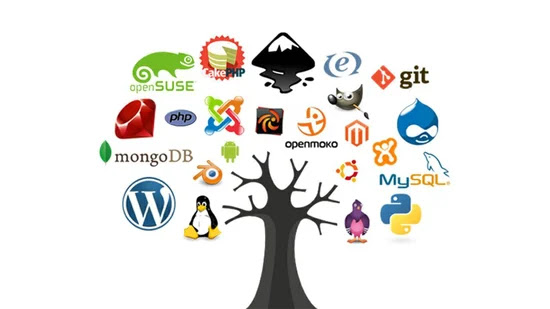Open Source Software (OSS) is a computer software released under a license that grants users the rights to use, study, change, and distribute the software and its source code. Open-source software (OSS) plays a critical role in the modern software landscape. Despite its widespread use in both commercial and non-commercial environments, several misconceptions persist regarding its nature, quality, and utility.
This article addresses common misconceptions about open-source software (OSS) that persist despite its widespread adoption and proven track record. Here are some of the most notable myths, along with clarifications.
 |
| Open-source software applications |
1. Open-source software is always free
People often equate "open source" with "free" in terms of price. Still, many open-source applications are available at no cost. Open source refers to the freedom to use, modify, and distribute the software (free as in "free speech"). Some open-source tools have paid versions or offer commercial support.
2. Open-source software is less secure than proprietary software
Many people persist in the myth that the source code is publicly available; it must be more vulnerable to attack. However, open-source software can be more secure, as many eyes can inspect and audit the code. However, security depends on how well the project is maintained, not merely whether it's open or closed source.
3. Open Source Software Lacks Quality and Support
Many assume that OSS has less or no support, but many open source projects have active communities, documentation, and forums. Some are also backed by companies that offer professional support (e.g., Red Hat, Canonical). Support may be different from traditional commercial software, but it's often available.
4. Open source is only for developers or tech experts
While OSS was once more technical, the many modern projects focus on user-friendly interfaces and accessibility. There are many open source applications designed for end users (e.g., LibreOffice, GIMP, VLC Media Player). While the ability to modify code is a significant advantage for developers, the average user can still utilize OSS effectively without needing to touch the code.
5. Open Source Software is Always Better Than Proprietary Software
While open source software has many advantages, it is not inherently superior to proprietary, premium, or paid software in all cases. The best choice depends on the user's specific needs and context. Factors such as functionality, support, cost, and ease of use should all be taken into account.
6. Open Source Is Less Secure
Due to the public availability of code, many feel that it's open; anyone can make dangerous changes and have vulnerabilities, but most reputable OSS projects have large communities, strict contribution guidelines, code reviews, and security audits. Malicious contributions are usually identified and rejected by maintainers or the community.
7. Open Source Software Cannot Be Used for Commercial Purposes
There is a common misconception that open-source software can't be used to generate revenue. Still, in reality, many companies build successful businesses around open-source software, offering services, hosting, support, and enterprise features (e.g., MongoDB, Elastic, GitLab). Open source and commercial success are not mutually exclusive.
8. Open source is legally risky
Many assume that OSS is a legal minefield, but open-source licenses are well-established and legally valid. As long as you understand the license (e.g., MIT, GPL, Apache), using OSS can be perfectly compliant.
Some examples include developed OSS Frameworks, programming languages, e-commerce platforms, and Content Management systems.
These myths and misconceptions can deter many organizations and individuals from fully leveraging the potential of using open source solutions.
Popular organizations, such as Nvidia Inc., have developed cuOpt (an open-source GPU-accelerated optimization engine delivering near real-time solutions for complex decision-making challenges), and Tesla, Inc. has made an open-source approach to their code on GitHub, primarily involving making its patents available to encourage the growth of the electric vehicle market and accelerate sustainable transportation.
In practice, open-source software is secure, scalable, reliable, and well-supported, with a strong future in both enterprise and consumer technology applications.

